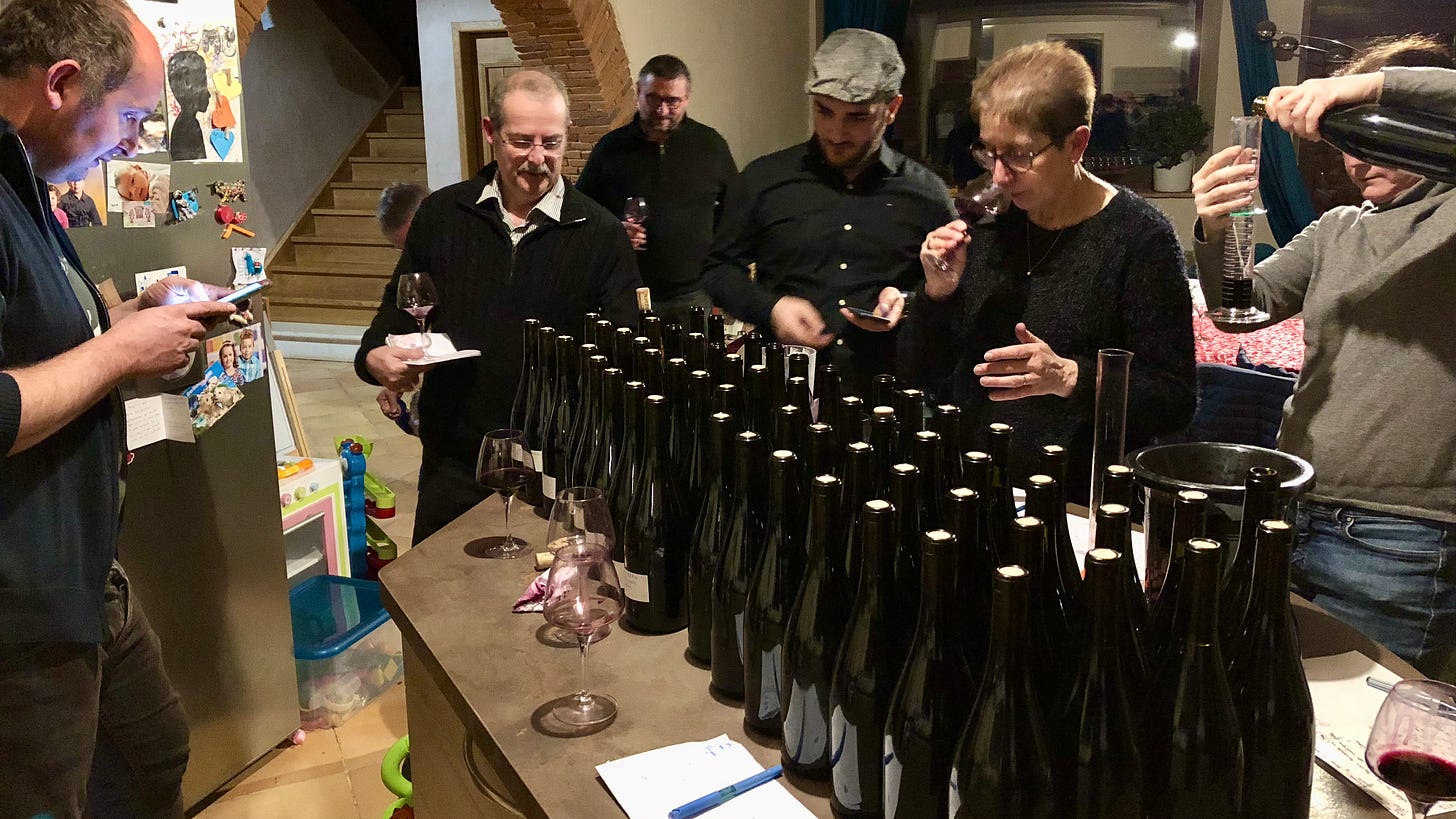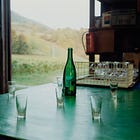Does Wine Writing Have To Be So Embarrassing?
Terroir denial, "wine as art," waiting lists, and the New York Times.
Dear readers, please know that I am tired. Exhausted by our wine media. I would prefer to spend my summer sitting near the beach, listening to old reggae songs in praise of Jah and sinsemilla, drinking silly cocktails, writing my next book, and minding my own business. But then someone sends me an article—like, say, this one published recently in the New York Times Magazine—and I…I just cannot.
This New York Times Magazine article is a profile of Maggie Harrison, the Oregon winemaker whose coveted Antica Terra wines are highly allocated, with at least a two-year waiting list for the privilege of paying $150 to $250 per bottle (or possibly higher and a longer wait now). Antica Terra wines can be lovely. You—as well as most readers of the New York Times, and probably me, along with the rest of humanity—will likely never (or never again) taste so much as a droplet of wine made by Maggie Harrison. Which is all fine. That’s wine, folks! Cry all you want, cult wines get expensive and hard to get your hands on. I’ve never met Maggie Harrison, but friends in Oregon that I respect say she is a nice and sincere person. Good for Maggie Harrison, both for the publicity and securing that bag. Huzzah.
My issue here is with the New York Times Magazine and the writer of this train wreck of a feature, which further illustrates why legacy media mostly does a lousy job of reporting on wine. “Maggie Harrison’s War on Wine” has all the standard problems that usually happen when big media sprains its ankles to cover this topic—which apparently can never be covered like any other normal part of culture. I’d bet the Times would never send a writer to profile Shohei Ohtani who didn’t totally understand baseball, or a reporter to profile Taylor Swift who didn’t have experience interviewing other pop music stars. But when it comes to wine, all bets are off. And I’m starting to wonder if this is by design.
With wine, general-interest magazines seem to always need an exaggerated conflict, some kind of straw man lurking as villain. I’m thinking of the New Yorker’s embarrassing 2019 orange-wine article, which positioned skin contact wine as “an assault on pleasure.” Or else mainstream media demands a pretzel-twist narrative that positions wine’s virtues as quasi-spiritual or part of wellness culture. I’m thinking of something like the Times mortifying 2019 piece on natural wine as self care. In either case, there’s always something that feels false in the thesis, the framing, and/or the execution of these sorts of wine pieces. “Maggie Harrison’s War on Wine” feels similarly false.
The Times writer, Alex Halberstadt, struggles mightily to establish that Maggie Harrison is a nonesuch, charming curmudgeon and that the way she makes wine is so incredibly different than every other winemaker in the world. Which is stretching the truth. The writer makes a big deal out of Harrison’s blending process, in which she and a tasting panel spend 10 days blind tasting and blending up to 150 barrel samples to arrive at the final blend.
That’s a lot, but there are plenty of winemakers around the world who painstakingly taste and blend in similar ways. For instance, here is a photo of the blind tasting panel of a winemaker named Nicolas Hirissou, the fourth generation winemaker of Domaine du Moulin in Gaillac, France. Hirissou’s group is tasting through dozens of lots and barrels of his prized grape braucol for his top blend, Florentin. You have likely never heard of Hirissou and you can buy his wine without a two-year waiting list for about $30.
Also, about three-quarters of winemakers one meets are curmudgeonly and irascible, and see themselves as mavericks. It’s a fun part of talking to winemakers. For instance, Hirissou is a falconer who hunts vineyard pests with an eagle and made a strange decision to plant California-friendly petite sirah in a part of southwest France not known for it. All of which is to say that there are iconoclastic winemakers all over the world, and very few of them ever get to a place where their wines demand a two-year waiting list.
But none of this stops the writer from pitting Harrison’s process as a lonely struggle against a popular American straw man: the “French” concept of terroir, a basic, universal agricultural concept. From the piece:
Uh oh. I wish I loved anything as much as a certain type of American wine person loves to hate the idea of terroir. I guess it’s an easy target since it’s a French word. Though I assume these same people use words like menu, toilet, garage, sauté, blonde—and sommelier—and many others every day. Unfortunately, Harrison takes the bait:
So much to unpack here. First of all, the whole discussion of “wine as art” walks the line of cringe. Wine is likely not art for any number of reasons. I dealt with this idea in Godforsaken Grapes, where I quoted the great Burgenland winemaker Roland Velich: “Well, art is art and wine is wine. Wine is not art. Wine is older than art.” I’ve also dealt with the wine-as-art question in an actual tragic scenario in this newsletter.
Declaring as “art” wines that few will ever experience (except maybe affluent people dining in Michelin-starred restaurants) seems the height of pretension. Or, at the very least, tone deaf. People can at least check Didion’s Slouching Toward Bethlehem out of the library, or look at reproductions of Basquiat’s work online. Anyone could have walked through Central Park to see Christo and Jeanne-Claude’s The Gates.
So setting aside the embarrassing argument of whether wine is art, let’s talk about the strange note of terroir denial here. Harrison is quoted very little on this, and we’re relying mainly on the writer’s exposition of her views. But I sincerely doubt she doesn’t believe in terroir, at least in its truest sense. I’m sure Harrison is fully aware that grape varieties grow better in some places, with different soils and in different climates, than others. If Harrison didn’t, why has she grown wine in Santa Barbara and Willamette Valley and not New Jersey or Iceland or Nicaragua? If there’s no terroir, why aren’t we talking about “Maine lobsters” from Kansas or “Florida oranges” from Alaska?
I’m also fairly sure Harrison is aware that culture is part of agriculture, and that a major part of terroir’s definition is culture, ie. how people who live in a certain place make wine in the tradition of that place. Since California and Oregon’s wine traditions only go back to the mid-20th century, perhaps that’s why the idea of “terroir” seems optional there? So, for me, the argument “against terroir” in this article is so facile that I suspect something else is at play here.
Perhaps it’s the writer’s own issues and insecurities with the capital-W concept of Wine and how people talk about it? Or perhaps it’s the Times editors cynically and lazily tapping into the old populist tropes of “wine snobbery” to shape a simple angle they can lean into. In any case they’ve ginned up an imagined “war” against a world of wine they’ve inaccurately defined. I believe in this passage the Times shows its ass:
So, according to this logic: If I describe a wine (say, a Loire Valley cabernet franc) in “typical tasting notes,” as having savory aromas and flavors of olive, tomato, oregano, and a hint of pencil lead on the finish, and I suggest it pairs really well with pizza, my “typical” tasting notes are “banal and dishonest”? But if I say that a wine “made me see colors: the inkiest indigos and the bluest blacks, streaked with fissures of silver” or that it made me “picture something lurching out of a cave on a moonless night during a thunderstorm” or that I thought of “the great former winemaker at Louis Jadot in Burgundy” then…what? This pretentious drivel is perceiving, feeling, and thinking about it? Cool descriptions, bro.
And, I’m sorry. I don’t care how great a wine is, tasting it alone is not automatically as immersive as watching a film. There are all sorts of exterior factors. I’ve tasted some of most famous wines in the world, and due to the atmosphere or the company or my own state of mind, I remember very little about them. It’s my business to remember wines, and I may remember a mid movie like Mike and Dave Need Wedding Dates more than some great wines. Yet, for similar reasons, I’ll remember some basic $11.99 wines for the rest of my life. That’s how taste works. To pretend otherwise is false.
I feel certain that Maggie Harrison knows this, too. I wish her the best.









I felt bad for Harrison after reading this. The writer makes her seem like the most pretentious person who’s ever lived and her wines like some sort of multidisciplinary art project. I doubt that’s how she really is or how she wants her wines to be perceived.
Great article! When I read the Times' Magazine feature, I rolled my eyes — but felt a little guilty for hating it. Now I feel much better.